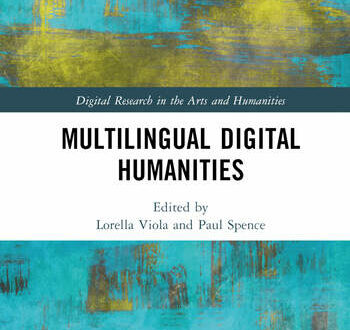The volume Multilingual Digital Humanities, edited By Lorella Viola and Paul Spence (Routledge, 2023) is finally out! Here is the table of content and a link to the book.
Introduction by Paul Spence and Lorella Viola
Part I—Multilingual/Multicultural Theory and Practice
- A model for Multilingual and Multicultural Digital Scholarship Methods Publishing: The Case of Programming Historian – Jennifer Isasi,Riva Quiroga, Nabeel Siddiqui, Joana Vieira Paulino, and Alex Wermer-Colan
- Diversifying Digital Biodiversity Knowledge: A Latin American Multilingual Perspective on the Biodiversity Heritage Library – Lidia Ponce de la Vega
- Applications and Developments of NLP Resources for Text Processing in Indian Languages: Shared Multilingual Corpora Building and Pre-trained Models – Justy Joseph, Lalithsriram SR, and Nirmala Menon
Part II—Pedagogy
- Doing Digital Humanities in the Modern Languages Classroom – Susanna Allés-Torrent
- Digital Learning Environments for SLA: Learning Analytics and the Construction of Knowledge – Alice Gasparini
- Pedagogy and Praxis in Libraries: Natural Language Processing for Non-English Texts – Ian Goodale
- Bridging the Gap Between Digital Humanities and Natural Language Processing: A Pedagogical Imperative for Humanistic NLP – Toma Tasovac, Nick Budak, Natalia Ermolaev, Andrew Janco, David Lassner
Part III—Language Models
- Linguistic Injustice in Multilingual Technologies: The TenTen Corpus Family as a Case Study – David Bordonaba-Plou and Laila M. Jreis-Navarro
- Typological Challenges for the Application of Multilingual Language Models in the Digital Humanities- Marcell Fekete, Johannes Bjerva, and Lisa Beinborn
- Data Scarcity and Methodological Limitations in Multilingual Analysis of News Articles Published in Brazil – Caio Mello
Part IV—Methods and Infrastructure
- Multilingual Interfaces for All? Localisation Strategies in Proyecto Humboldt Digital – Antonio Rojas Castro
- Towards Multilingually Enabled Digital Knowledge Infrastructures: A Qualitative Survey Analysis – Alíz Horváth, Cornelis van Lit, Cosima Wagner, and David Joseph Wrisley
- Digital Approaches to Multilingual Text Analysis: The Dictionnaire de la langue franqueand Its Morphology as Hybrid Data in the Past – Josh Brow
And here is the abstract of my contribution “Doing Digital Humanities in the Modern Languages Classroom “:
This paper analyzes the nature and implications of studying and practicing Digital Humanities (DH) within a Modern Languages (ML) context based on my own pedagogical experience in teaching Spanish-language courses in a university in the United States. First, I explore the challenges of introducing digital literacies to a student body population that has traditionally been exposed mainly to language, culture, and literature courses. An audience that frequently has no previous experience with DH and that can potentially feel doubly challenged by the fact of studying in a foreign language. In this sense, concepts and contents need to be situated and critically appraised in the target language and culture, along the lines of what has been called Critical DHML. Second, I approach the relative lack of pedagogical materials and computational resources available in Spanish, and I discuss the value of recent resources which now help to partially overcome this situation. Third, I showcase several ways, born out of my pedagogical experience, to introduce digital methods in the classroom while exploring the cultural and literary past, digging into the present, and appraising the extent of digital data. Examples include experiments in text encoding, mapping, and text mining. Finally, I also insist on questions of knowledge creation and the implications of technological choices, especially in the context of data- driven projects. Values such as open access, open source and the ethical practices of minimal computing need to be situated in social and cultural backgrounds to better understand the digital object.
